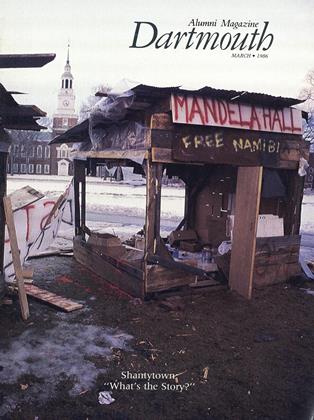The international competition is fierce, but Diana Golden '84 and Martha Hill '82 have an excellent shot at being the number-one and number-two one-legged skiers in the world. "Who will place where is hard to say," said Hill, "but we'll make sure it stays in the Dartmouth family!"
Golden, Hill, and Patti Werner make up that division of the U.S. Women's Handicap Ski. Team of skiers who race on one leg. In April, they will compete in the Fourth World Winter Games for the Disabled in Falun, Sweden, and there they will race against some of the toughest competition in the world. Martha and Diana are both confident that one of the three Americans will come home with the World Championship title.
Diana's and Martha's early histories are quite similar. Both women lost one leg to cancer, Diana when she was 12 and Martha when she was 17. Both had skied casually before, but neither had raced on two legs. Both were encouraged by ski coaches in high school to do something more with their skiing, and both responded to the challenge by finding ways to become world-class skiers.
Six months after her amputation in 1977, Hill got back on skis and learned how to three-track ski, i.e., ski on one ski and use outriggers instead of ski poles. Through a Dartmouth internship program in 1981-82, she taught skiing in the Winter Park Handicap Ski Program, Winter Park, Colo., and consequently was able to continue her own training. It was there that she began to really show her talent for racing. Since then, she said, "I have placed in the top three at every Invitational, Regional, National, and Canadian National race that I have finished."
Golden began training with her high school ski team at the end of her sophomore year. In 1980, when she was 16, she went to the Nationals. She made the U.S. Ski Team and went to the Olympics in Norway. Although she didn't do well there, she kept up her training, entering Dartmouth in the fall of 1980 and working out with the Dartmouth Women's Ski Team. It was there, she says, that she learned to "do stadiums," i.e., run up and down the steps in the football stadium. In 1982, she raced in Switzerland, winning the downhill and placing second in the giant slalom. This gave her the title of Number-One World Handicapped Woman Skier. She retired from racing and returned to Dartmouth to complete her education, not planning to race again.
While out skiing with some friends in 1985, she realized how much she missed racing, the satisfaction of training, and the thrill of doing her best. She went to Sugar Loaf in Maine for the week before the Nationals to work with a coach there. It all came back to her, she said. Last summer she spent six weeks training and skiing on a glacier in France, and when she returned to the U.S., she was fully committed to the long road back to the toP-
Like Hill, Golden wants to be first this year: "I hate being second or third!" Then she wants to move up into the nonhandicapped ranks. "But I don't like to talk about specific goals, because I really don't know what's possible," she said.
The cost of training full time is enormous. For Hill and Golden, it is possible only if they are willing to train all day and work at night. They both are learning fund-raising and public relations skills in order to seek donations for their training. They cheerfully accept contributions, which are tax deductible, and which may be sent in their names to NHSRA/US Disabled Ski Team, Capital Hill Station, P.O. Box 18664, Denver, CO 80218.
Pictured at the 1985 U.S. Handicap Championships held in Breckenridge, Colo., are, leftto right, Head Coach Chris Christensen, Diana Golden '84, who placed third overall, MarthaHill '82, who placed second overall, and Homer Jennings, assistant coach. Behind them isthe banner with the logo for the National Handicapped Sports and Recreation Associationwhose motto is "If I can do this, I can do anything."
Diana Golden '84 raced toward a first-place win in the downhill competition at LesMosses,Switzerland, in 1982.
 View Full Issue
View Full Issue
More From This Issue
-
 Feature
Feature"Dear Folks..."
March 1986 By H. Nicholas Muller III '60 -
 Cover Story
Cover StoryShanty town "What's the story?"
March 1986 By Peter Mandel and Doug Greenwood '66 -
 Feature
FeatureThe Case of the Prodigal Son
March 1986 By Bruce Ducker '60 -
 Article
ArticleMatthew Marshall: Keeper of the Inn
March 1986 By Georgia Croft -
 Article
ArticleFaculty governance report is released
March 1986 -
 Class Notes
Class Notes1984
March 1986 By Eric M. Grubman
Peggy Sadler
-
 Feature
FeatureMaking it Happen
JUNE/JULY 1984 By Peggy Sadler -
 Article
ArticleJay Weinberg '40 has a CAN-do attitude
NOVEMBER 1984 By Peggy Sadler -
 Article
ArticleLover of parades
DECEMBER 1984 By Peggy Sadler -
 Article
ArticleLes Nichols '40 leads nostalgic tours of Normandy
MAY 1985 By Peggy Sadler -
 Article
ArticleJack Turco: Promoter of "wellness"
SEPTEMBER 1985 By Peggy Sadler -
 Article
ArticleA Family Tree Rooted in History
SEPTEMBER 1985 By Peggy Sadler







